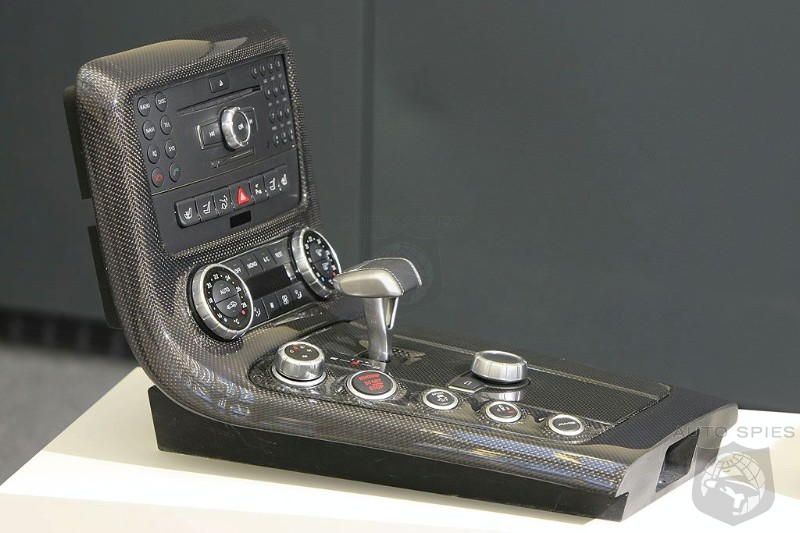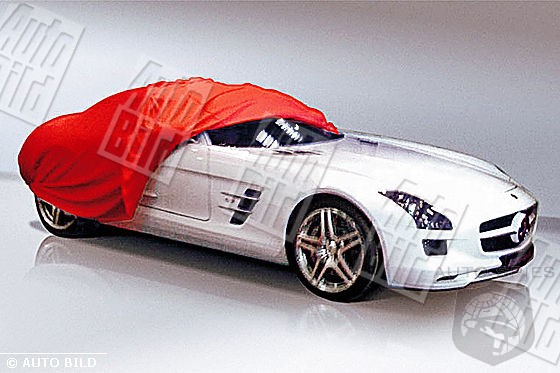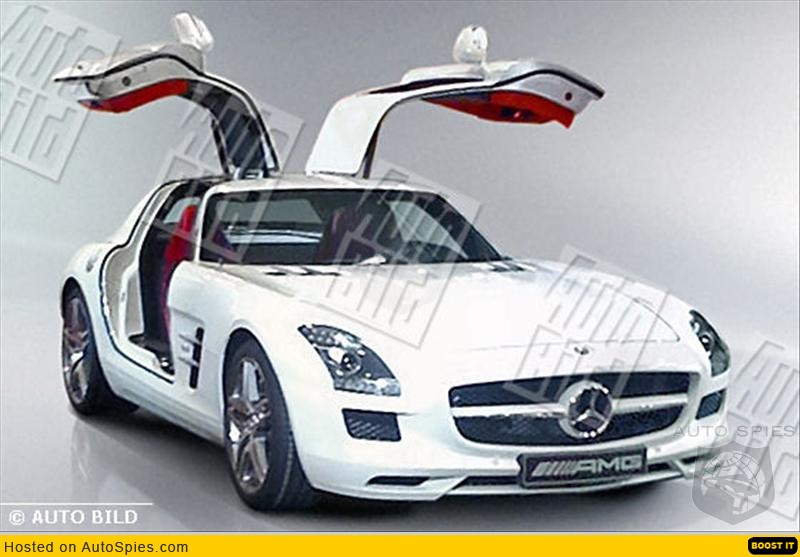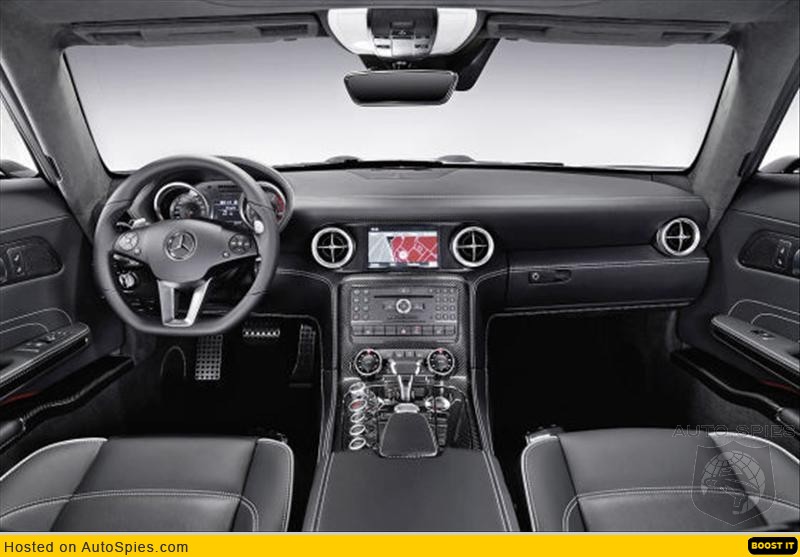Mercedes-Benz SLS AMG Gullwing Official Thread
#36
http://www.edmunds.com/insideline/do...ticleId=152606






The Gullwing Is Reborn, and We Drive It
By Andreas Stahl, Contributor Email
Date posted: 07-13-2009
The back-and-white prototype appears over the gentle rise in the wide main straight and spears past us, pursued by the deeply penetrating bark of its V8 engine. As it accelerates past, the front end lifts ever so slightly under the strain of power being delivered to the rear wheels. The car has a low set and an unmistakably cab-back profile. From our vantage point on the pit wall, it's curvy but lean and distinctly retro.
This is the 2010 Mercedes-Benz SLS AMG, and the official line from Stuttgart is that AMG development chief Tobias Moers is simply testing it here on the 2.2-mile Sachsenring circuit, an hour or so from Dresden, Germany. This is the last in a long series of development tests for the SLS supercar over the past two years, and it's meant to be the last stage before the production version will be revealed in September at the 2009 Frankfurt Auto Show.
But the car's disguise isn't fooling us. What we're looking at — and indeed about to drive — is the production-ready Mercedes-Benz Gullwing in all but name. Apart from a few rough edges, this is the 2010 Mercedes-Benz SLS, the same car that will come to the U.S. next year.
The Gullwing Is Reborn
The Mercedes-Benz 300 SL reinvented Mercedes-Benz on the world stage by winning the 1952 24 Hours of Le Mans and the 1952 Carrera Panamericana, and the 300 SL's unique gullwing-style doors gave the production car that followed a look that has been identified with Mercedes-Benz ever since. Now collectible examples of the Gullwing SL fetch as much as $200,000 on the auction block, or slightly more than Mercedes-Benz is expected to charge for this new one.
There's a good deal for this car to live up to, then. But as the lightly camouflaged SLS comes within earshot again and rumbles to a halt beside us in the pit lane, there's little doubt in our mind that Mercedes-Benz has got it right.
Though this car has a throwback profile, underneath you'll find an aluminum body and a state-of-the-art aluminum space frame, elements of which are set to be adopted on the next-generation SL. It might seem like a backward step after experimenting with a full carbon-fiber monocoque with the McLaren-engineered Mercedes-Benz SLR McLaren, but as Tobias Moers tells us, "Aluminum is a better material, especially when it comes to quelling vibration."
Power by AMG
Under the hood is a revised version of AMG's familiar 6.2-liter M156 V8. Such are the extent of the changes — bucket-style tappets, dry-sump lubrication and twin exhaust headers — that the engine is now designated the M159. It delivers 571 horsepower at 6,800 rpm and 479 pound-feet of torque at 4,750 rpm.
When you lift the hood, you see that an aluminum subframe sites the engine well behind the wheels and hard up against the firewall, so the main mass lies within the wheelbase, which delivers a low polar moment of inertia for quicker handling responses. Ahead of the engine lie the small 5.0-liter oil tank, various radiators and a mass of cooling ducts.
The dual-clutch transmission is integrated with the rear axle, and this transaxle arrangement improves weight distribution further. It's connected to the engine by an aluminum torque tube, and within this spins the carbon-fiber driveshaft, said to weigh less than half of a steel driveshaft.
You Sit Here
The driver plays a part, too. "We've attempted to set the driver's seat as far back within the wheelbase as possible," says Moers. "It is quite extreme for a road car." He draws parallels with Mercedes-Benz's front-engine DTM racing cars.
It all adds up to an overall weight distribution of 48 percent front and 52 percent rear. "Just about perfect for a rear-wheel-drive car," Moers notes proudly. He has lived and breathed the SLS since it was given the go-ahead for production in early 2006.
The car has a wheelbase of 105.5 inches and the track measures 66.1 inches in front and 64.9 inches in the rear. Double-wishbone independent suspension is used at all four corners. Moers claims the reborn Gullwing is endowed with the sort of cornering grip that will put its front-engine rivals to shame, and even a few midengine cars besides.
Time To Find Out
To enter the cabin, you reach down for the door handle nearly at knee level and then the gullwing-style door arcs skyward with the help of two sturdy gas struts. It is quite a stretch across the door sill, which is also a good 18 inches above the road. The best method seems to be legs first, as you support your weight with your arms before dropping down into the thinly padded carbon-fiber seat.
Take stock. Unlike the McLaren SLR, the SLS feels snug, not cramped, and there's a far better relationship between driver and steering wheel. You sit low and the windscreen is quite upright. Interaction between driver and machine is through a flat-bottom steering wheel and two well-placed pedals. Apart from the bulge in the middle of the hood, your vision toward the front is uninterrupted.
Though the claims made for the SLS's performance put it in supercar territory, the cabin is clearly that of a luxury cruiser. There's a contrived aviation theme evident in the design of the dashboard, which is covered in a combination of aluminum, carbon fiber and leather. The power-adjustable seats are heated, the usual bits are power-operated, the latest satellite-based navigation is present and the audio is brought to you by Bang & Olufsen.
Depress the start button along the center console, flick the right-hand shift paddle with the tips of the fingers, tickle the accelerator, and — whooaa — we're off in a roar of exhaust.
Onto the Track
While we're tooling up the pit lane, a row of lights atop the instrument binnacle do their best impression of a Christmas tree — first turning green, then orange and finally red to indicate the approaching onset of the rpm limiter. As the shift paddle clacks into 2nd gear and the dual-clutch transaxle does its job in an instant, the flavor of the SLS really starts to flow through. Once the first lap is in, the SLS immediately feels quick and spirited, solid and planted. It's a car you immediately feel at home in.
The modified AMG V8 has a whole new level of throttle response. You can sense the eagerness building from down low in the rpm range, which isn't much of a surprise given the sturdy 402 lb-ft of torque available at just 2,500 rpm.
On a flowing track like this, you're rarely using less than half the engine's available revs. And sure enough, it is through the midrange where the full extent of the changes made to the 6.2-liter V8 become evident. When your foot is heavy on the throttle pedal, the engine hauls with great enthusiasm, racing around to the 5,000-rpm sweet spot. But with the redline set at 7,200 rpm, there's a lot more to come.
While AMG engines are well known for a loping, almost unstressed feel, this one has a distinctly resolute character at high rpm — more Le Mans than NASCAR. It is all backed up by the lightning reactions of the seven-speed dual-clutch automated manual transmission. In no time at all we're back around onto the main straight, pushing hard in 4th gear as the braking markers for the first corner appear.
Stopping and Steering
The first corner is a long, long downhill 180-degree bend, and it reveals a great deal about the character of the SLS. Though the steering effort is surprisingly light in a straight line, it weights up superbly in the corners as the quick-ratio 13.1:1 rack and pinion takes effect. More important, the steering imparts a direct, communicative feel like no other Benz we've driven, SLR included.
Draw the left-hand shift paddle forward a couple of times to select a lower gear and the SLS peels into corners positively but without any unsettling weight transfer. The body remains resolutely flat, and even slight movements are well controlled. Once the car is committed, the chassis' reactions prove progressive and forgiving.
This car's carbon-ceramic brakes (the optional setup, we're told) have 15.4-inch rotors in front and 14.2-inch rotors in the rear, and they're hugely powerful, providing instant bite and fade-free operation lap upon lap.
Passing the Driving Test
This is a challenging track, wildly undulating and with a dizzying combination of straightaways, kinks and corners to test the mettle of any car. One thing is abundantly clear here, and that is the loads of grip and extraordinary traction afforded by the SLS. Our confidence level increases with every lap. Brake late, turn in, get on the power early and even then we feel as if we're no nearer to discovering the car's limits.
In the end, you can sense when the tires are beginning to squirm and purchase is about to give way, just as you can with all real drivers' cars that communicate the action directly to the driver. Of course, since these are very wide tires — 265/35ZR19s up front and 295/30ZR20s at the rear — once they do let go, you'd think the SLS is bound to spin down the road like a gyroscope.
But not so. Even when you completely disengage the three-stage stability control, the tail of the car steps out progressively enough for you to either hold it out there or back off fractionally until the rear tires have regained their purchase. Moers says the SLS is good for 1.38g on the skid pad, and it's hard to doubt him. In any case, you can carry big speed up to the apex of a corner and rely on the subtleties of the chassis to cope with the G-forces without fear of a wild, backward exit from the pavement.
The 2010 Mercedes-Benz SLS AMG might look like the SL Gullwing of the 1950s, but it's clearly meant to challenge the best of today's exotic sports cars, like the Audi R8, the Nissan GT-R and the Porsche 911 Turbo.
By Andreas Stahl, Contributor Email
Date posted: 07-13-2009
The back-and-white prototype appears over the gentle rise in the wide main straight and spears past us, pursued by the deeply penetrating bark of its V8 engine. As it accelerates past, the front end lifts ever so slightly under the strain of power being delivered to the rear wheels. The car has a low set and an unmistakably cab-back profile. From our vantage point on the pit wall, it's curvy but lean and distinctly retro.
This is the 2010 Mercedes-Benz SLS AMG, and the official line from Stuttgart is that AMG development chief Tobias Moers is simply testing it here on the 2.2-mile Sachsenring circuit, an hour or so from Dresden, Germany. This is the last in a long series of development tests for the SLS supercar over the past two years, and it's meant to be the last stage before the production version will be revealed in September at the 2009 Frankfurt Auto Show.
But the car's disguise isn't fooling us. What we're looking at — and indeed about to drive — is the production-ready Mercedes-Benz Gullwing in all but name. Apart from a few rough edges, this is the 2010 Mercedes-Benz SLS, the same car that will come to the U.S. next year.
The Gullwing Is Reborn
The Mercedes-Benz 300 SL reinvented Mercedes-Benz on the world stage by winning the 1952 24 Hours of Le Mans and the 1952 Carrera Panamericana, and the 300 SL's unique gullwing-style doors gave the production car that followed a look that has been identified with Mercedes-Benz ever since. Now collectible examples of the Gullwing SL fetch as much as $200,000 on the auction block, or slightly more than Mercedes-Benz is expected to charge for this new one.
There's a good deal for this car to live up to, then. But as the lightly camouflaged SLS comes within earshot again and rumbles to a halt beside us in the pit lane, there's little doubt in our mind that Mercedes-Benz has got it right.
Though this car has a throwback profile, underneath you'll find an aluminum body and a state-of-the-art aluminum space frame, elements of which are set to be adopted on the next-generation SL. It might seem like a backward step after experimenting with a full carbon-fiber monocoque with the McLaren-engineered Mercedes-Benz SLR McLaren, but as Tobias Moers tells us, "Aluminum is a better material, especially when it comes to quelling vibration."
Power by AMG
Under the hood is a revised version of AMG's familiar 6.2-liter M156 V8. Such are the extent of the changes — bucket-style tappets, dry-sump lubrication and twin exhaust headers — that the engine is now designated the M159. It delivers 571 horsepower at 6,800 rpm and 479 pound-feet of torque at 4,750 rpm.
When you lift the hood, you see that an aluminum subframe sites the engine well behind the wheels and hard up against the firewall, so the main mass lies within the wheelbase, which delivers a low polar moment of inertia for quicker handling responses. Ahead of the engine lie the small 5.0-liter oil tank, various radiators and a mass of cooling ducts.
The dual-clutch transmission is integrated with the rear axle, and this transaxle arrangement improves weight distribution further. It's connected to the engine by an aluminum torque tube, and within this spins the carbon-fiber driveshaft, said to weigh less than half of a steel driveshaft.
You Sit Here
The driver plays a part, too. "We've attempted to set the driver's seat as far back within the wheelbase as possible," says Moers. "It is quite extreme for a road car." He draws parallels with Mercedes-Benz's front-engine DTM racing cars.
It all adds up to an overall weight distribution of 48 percent front and 52 percent rear. "Just about perfect for a rear-wheel-drive car," Moers notes proudly. He has lived and breathed the SLS since it was given the go-ahead for production in early 2006.
The car has a wheelbase of 105.5 inches and the track measures 66.1 inches in front and 64.9 inches in the rear. Double-wishbone independent suspension is used at all four corners. Moers claims the reborn Gullwing is endowed with the sort of cornering grip that will put its front-engine rivals to shame, and even a few midengine cars besides.
Time To Find Out
To enter the cabin, you reach down for the door handle nearly at knee level and then the gullwing-style door arcs skyward with the help of two sturdy gas struts. It is quite a stretch across the door sill, which is also a good 18 inches above the road. The best method seems to be legs first, as you support your weight with your arms before dropping down into the thinly padded carbon-fiber seat.
Take stock. Unlike the McLaren SLR, the SLS feels snug, not cramped, and there's a far better relationship between driver and steering wheel. You sit low and the windscreen is quite upright. Interaction between driver and machine is through a flat-bottom steering wheel and two well-placed pedals. Apart from the bulge in the middle of the hood, your vision toward the front is uninterrupted.
Though the claims made for the SLS's performance put it in supercar territory, the cabin is clearly that of a luxury cruiser. There's a contrived aviation theme evident in the design of the dashboard, which is covered in a combination of aluminum, carbon fiber and leather. The power-adjustable seats are heated, the usual bits are power-operated, the latest satellite-based navigation is present and the audio is brought to you by Bang & Olufsen.
Depress the start button along the center console, flick the right-hand shift paddle with the tips of the fingers, tickle the accelerator, and — whooaa — we're off in a roar of exhaust.
Onto the Track
While we're tooling up the pit lane, a row of lights atop the instrument binnacle do their best impression of a Christmas tree — first turning green, then orange and finally red to indicate the approaching onset of the rpm limiter. As the shift paddle clacks into 2nd gear and the dual-clutch transaxle does its job in an instant, the flavor of the SLS really starts to flow through. Once the first lap is in, the SLS immediately feels quick and spirited, solid and planted. It's a car you immediately feel at home in.
The modified AMG V8 has a whole new level of throttle response. You can sense the eagerness building from down low in the rpm range, which isn't much of a surprise given the sturdy 402 lb-ft of torque available at just 2,500 rpm.
On a flowing track like this, you're rarely using less than half the engine's available revs. And sure enough, it is through the midrange where the full extent of the changes made to the 6.2-liter V8 become evident. When your foot is heavy on the throttle pedal, the engine hauls with great enthusiasm, racing around to the 5,000-rpm sweet spot. But with the redline set at 7,200 rpm, there's a lot more to come.
While AMG engines are well known for a loping, almost unstressed feel, this one has a distinctly resolute character at high rpm — more Le Mans than NASCAR. It is all backed up by the lightning reactions of the seven-speed dual-clutch automated manual transmission. In no time at all we're back around onto the main straight, pushing hard in 4th gear as the braking markers for the first corner appear.
Stopping and Steering
The first corner is a long, long downhill 180-degree bend, and it reveals a great deal about the character of the SLS. Though the steering effort is surprisingly light in a straight line, it weights up superbly in the corners as the quick-ratio 13.1:1 rack and pinion takes effect. More important, the steering imparts a direct, communicative feel like no other Benz we've driven, SLR included.
Draw the left-hand shift paddle forward a couple of times to select a lower gear and the SLS peels into corners positively but without any unsettling weight transfer. The body remains resolutely flat, and even slight movements are well controlled. Once the car is committed, the chassis' reactions prove progressive and forgiving.
This car's carbon-ceramic brakes (the optional setup, we're told) have 15.4-inch rotors in front and 14.2-inch rotors in the rear, and they're hugely powerful, providing instant bite and fade-free operation lap upon lap.
Passing the Driving Test
This is a challenging track, wildly undulating and with a dizzying combination of straightaways, kinks and corners to test the mettle of any car. One thing is abundantly clear here, and that is the loads of grip and extraordinary traction afforded by the SLS. Our confidence level increases with every lap. Brake late, turn in, get on the power early and even then we feel as if we're no nearer to discovering the car's limits.
In the end, you can sense when the tires are beginning to squirm and purchase is about to give way, just as you can with all real drivers' cars that communicate the action directly to the driver. Of course, since these are very wide tires — 265/35ZR19s up front and 295/30ZR20s at the rear — once they do let go, you'd think the SLS is bound to spin down the road like a gyroscope.
But not so. Even when you completely disengage the three-stage stability control, the tail of the car steps out progressively enough for you to either hold it out there or back off fractionally until the rear tires have regained their purchase. Moers says the SLS is good for 1.38g on the skid pad, and it's hard to doubt him. In any case, you can carry big speed up to the apex of a corner and rely on the subtleties of the chassis to cope with the G-forces without fear of a wild, backward exit from the pavement.
The 2010 Mercedes-Benz SLS AMG might look like the SL Gullwing of the 1950s, but it's clearly meant to challenge the best of today's exotic sports cars, like the Audi R8, the Nissan GT-R and the Porsche 911 Turbo.






#37
While I know that the details are all a throwback to the original gullwing, the proportions scream Dodge Viper to me.
None the less, this seems like a great car. I'm excited to see the final version.
None the less, this seems like a great car. I'm excited to see the final version.
#41
I don't get it. How does the interior look cheap?
I think people need to stop associating an exorbitant price tag with an overkill interior. An incredibly expensive car can have a cabin that is designed to emit a certain radiance and feel. The briefing for this car probably demanded this, too. In this case I would say that the atmosphere the interior creates is serious and sporty with a touch of blandness. The materials look good to me and the carbon fiber adds an incredibly sporty touch to the cabin. Dark plastic does not automatically equate to "cheapness".
The fact that it seems to share interior parts with other Mercedes products is not a turn-off to me. What's the problem anyway? I've seen Toyota Landcruiser seat controls in the Lexus LS. So what?
I think people need to stop associating an exorbitant price tag with an overkill interior. An incredibly expensive car can have a cabin that is designed to emit a certain radiance and feel. The briefing for this car probably demanded this, too. In this case I would say that the atmosphere the interior creates is serious and sporty with a touch of blandness. The materials look good to me and the carbon fiber adds an incredibly sporty touch to the cabin. Dark plastic does not automatically equate to "cheapness".
The fact that it seems to share interior parts with other Mercedes products is not a turn-off to me. What's the problem anyway? I've seen Toyota Landcruiser seat controls in the Lexus LS. So what?

#44
Well the official pricing and packages have leaked out, and while there have been jokes about German companies "nickel and diming you", this SLS takes it to a new level. See below:

- $4,500 for carbon fiber trim
- $9,000 for extended interior carbon fiber package
- $5,400 for carbon fiber engine cover
- $5,000 for carbin fiber side mirror caps
Rims:

Carbon Fiber interior:

$10,000 Paint option:

$5,000 CF mirror caps:


More pics and info here: http://www.easycarblog.com/2009/07/m...d-online.html/

- $4,500 for carbon fiber trim
- $9,000 for extended interior carbon fiber package
- $5,400 for carbon fiber engine cover
- $5,000 for carbin fiber side mirror caps
Rims:

Carbon Fiber interior:

$10,000 Paint option:

$5,000 CF mirror caps:


More pics and info here: http://www.easycarblog.com/2009/07/m...d-online.html/









 .....and that's the amg showing too. I agree about the snout thing.
.....and that's the amg showing too. I agree about the snout thing.

